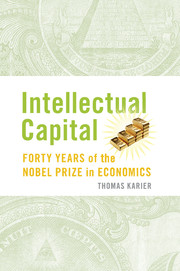Book contents
- Frontmatter
- Contents
- Preface
- Economic Nobel Laureates
- 1 An Economic Prize
- 2 Free-Market Economics
- 3 Micro: The Chicago School
- 4 Stock Market Casino
- 5 More Micro
- 6 Behaviorists
- 7 Keynesians
- 8 Classical Revival
- 9 Inventors
- 10 Game Geeks
- 11 General Equilibrium
- 12 A World View
- 13 Numbers Guys
- 14 History and Institutions
- 15 Reshaping the Prize
- Notes
- Index
- Frontmatter
- Contents
- Preface
- Economic Nobel Laureates
- 1 An Economic Prize
- 2 Free-Market Economics
- 3 Micro: The Chicago School
- 4 Stock Market Casino
- 5 More Micro
- 6 Behaviorists
- 7 Keynesians
- 8 Classical Revival
- 9 Inventors
- 10 Game Geeks
- 11 General Equilibrium
- 12 A World View
- 13 Numbers Guys
- 14 History and Institutions
- 15 Reshaping the Prize
- Notes
- Index
Summary
On October 14, 1997, the Swedish Academy of Sciences announced the winners of the Nobel Prize in economics, Myron S. Scholes and Robert K. Merton. They were honored for developing ingenious formulas for calculating the value of financial instruments, including options, a simple but difficult contract to value.
Less than one year later, however, there was a sudden turn of events. The Federal Reserve Bank of New York quietly convened high-level negotiations to avoid one of the largest bankruptcies to ever threaten Wall Street involving the same two Nobel Prize winners. The company causing the trouble was Long-Term Capital Management (LTCM), which not only applied the theories of laureates Scholes and Merton, but also counted them among the company's principals. In less than a year, they became famous for winning the Nobel Prize and then infamous for one of the most spectacular business failures in history. The Nobel laureates at LTCM looked like geniuses until the market destroyed them financially. Why did Merton and Scholes receive a Nobel Prize? And why did their ideas fail so miserably in the real world?
The stock market has always attracted the attention of economists as both an essential economic institution and as a testing ground for new ideas. Although you might think that familiarity with the great theories of economics would be an advantage in the market, the actual track record of economists has been mixed.
- Type
- Chapter
- Information
- Intellectual CapitalForty Years of the Nobel Prize in Economics, pp. 58 - 72Publisher: Cambridge University PressPrint publication year: 2010



